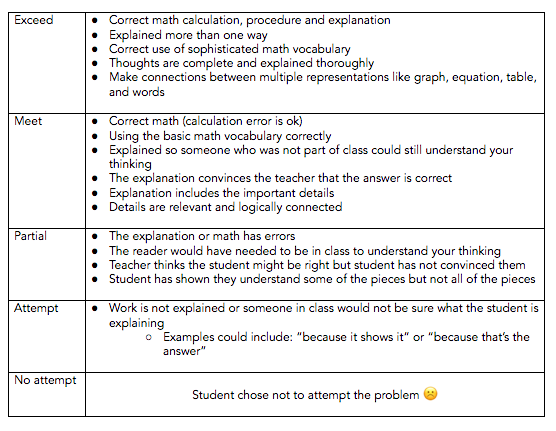- MN ABE Connect
- Archive
- Why Effective Communication Should Be Part of Your Math Curriculum
 October 14, 2019
October 14, 2019
Why Effective Communication Should Be Part of Your Math Curriculum
Kathryne Chiqui, Teacher & Instructional Coach Amber Delliger, ABE InstructorIt is a well-known fact that ABE teachers don’t have a lot of instructional time to work their magic. We need to ensure that our students are able to identify skill gaps, build content knowledge, master soft skills, develop technology skills, plan for the future, and take standardized tests, all in a minimal number of hours. One of the ways to maximize our time with students is to be purposeful and intentional about integrating skills, content, and goals within each lesson.
Over the past year, we have been exploring ways to be purposeful and intentional about embedding the Academic, Career, and Employability Skills (ACES) into our math instruction. While many of the ACES categories tie well into a math class, we specifically focused on Effective Communication.
Why Effective Communication (EC)?
We strongly believe that in a classroom, those who are doing the talking are doing the learning.
Using meaningful discourse provides a tool to explore higher order thinking questions (How? Why?) at a higher depth-of-knowledge level. The students are able to utilize communication to focus on thoughts, strategies, and possible solutions rather than racing through just one solution pathway.
Also, focusing on effective communication in a math classroom is likely an experience few of our learners have had in the past. Many of our students have been rarely been encouraged to use their voice in mathematical contexts and need support, guidance and even some modeling to do so with confidence.
Effective Communication supports equity
None of our students enter our classrooms as a blank slate. By providing a safe environment to explore, share, and reflect on their thinking and the thoughts of others, we are honoring the vast experience that they bring to the classroom. It is also important to remember that since so few adults have had a valued voice in the math classroom, they may not have the vocabulary or experience necessary to know how to effectively ask and answer questions, or to explain their own thinking. Providing the proper supports and scaffolds to bring more voices into the room improves the access of the material to more of the learners in the space.
There is also strength in exploring the approaches of others in a way that values each contribution, even those that may not be correct. A classroom designed and fostered to encourage and value contributions from all reduces the hierarchy students that is sometimes created when someone gets all the answers quickly (or voices them the loudest.) Incorporating effective communication can empower all learners as critical thinkers, problem solvers, and most importantly, mathematicians.
How to support students to ask better questions, give better answers, share ideas with each other
If you are like us, discussing math was never an experience I had growing up. Most students haven’t had that experience either. This means often times when you ask them to turn and talk to each other, they don’t know what to say, or how to say it. Question and sentence stems are an excellent tool to provide support while they develop these important skills. Below are a few examples you can use with students.

If you are interested in more question/sentence stem examples, find them here >>
It is important that we don’t just hand students these resources expecting them to know exactly how to use them. It is important to embed modeling these questions and sentence stems as well as time to practice them into your lessons as often as possible. This helps students practice these skills with support until they are just part of their mathematical toolbox.
Effective communication isn’t just spoken, but written as well. This means that students also need multiple opportunities to see you model written explanations of problems on the board and read them in books. Asking students to write up their thinking and how they solved a problem is an important part of the math classroom. This activity should not just be a push exercise that you use for students that already understand the math concept. This skill is important no matter what level of math they are at.
Creating a classroom environment where this practice is an expectation is important as well. By practicing how to effectively communicate, students are able to articulate their thinking better and when and what they do not understand. These skills are important for all learners, no matter what their language proficiency is.
How to evaluate if students are utilizing EC?
Providing specific feedback to students about how to make their communication more effective can be challenging. Below is a rubric that, even though it was written for use with high school students, is a valuable resource to use when you are beginning the practice of providing constructive feedback regarding students’ communication skills. It helps us teachers know what effective communication looks like so that we can clearly share those expectations with students.

Access the digital form of this document here >>
Resources to learn more
There are so many great resources to help you improve your use of effective communication in the classroom. While we only listed a few here, we encourage you to spend some time on the ATLAS website (https://atlasabe.org/key-activities/numeracy/) to learn more!
Online communities
In addition to the resources mentioned above, there are many active math communities you could join as well. The first group is a Schoology group facilitated through ATLAS called the MN Numeracy Instruction Networking Group.
To join, go to the Schoology website (www.schoology.com), create an instructor account if you don’t have one, and then enter the code PXNGW-K43CR to join the group. There are also more detailed instructions in this MN ABE Connect article.
There is also a very active math community on Twitter. Search #MTBoS to connect with amazing math people, resources, and ideas.


Newsletter Signup
Get MN ABE Connect—the official source for ABE events, activities, and resources!
Sign UpArticle Categories
- ABE Foundations/Staff Onboarding
- ACES/Transitions
- Adult Career Pathways
- Assessment
- CCR Standards
- Citizenship
- COVID-19
- Cultural Competency
- Digital Literacy/Northstar
- Disabilities
- Distance Learning/Education
- ELA
- Equity/Inclusion
- ESL
- HSE/Adult Diploma
- Listening
- Math/Numeracy
- Mental Health
- Minnesota ABE
- One-Room Schoolhouse/Multilevel
- Professional Development
- Program Management
- Reading
- Remote Instruction
- Science
- Social Studies
- Speaking/Conversation
- Support Services
- Teaching Strategies
- Technology
- Uncategorized
- Volunteers/Tutors
- Writing